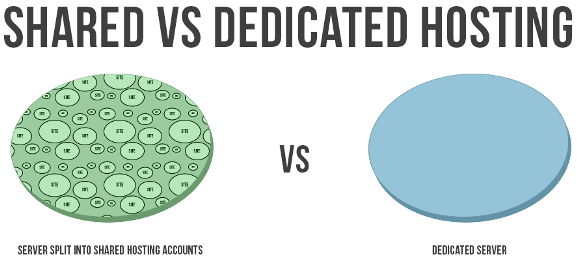Table of Content
It is not uncommon for entrepreneurs to be at cross roads while deciding which type of hosting best meets their business needs.
You cannot fault them. The quality and type of hosting will eventually influence the bottom lines of their companies.
Here are a few guidelines that should help entrepreneurs make up their minds.
First of all, the nature of business you are involved in primarily decides the type of hosting you need.
Before proceeding further let us refresh on the definition of two most common types in the market – shared and dedicated server hosting.
Shared hosting is web hosting in which the hosting vendor serves multiple clients each with its own domain name, from a single server.
On the other hand dedicated server hosting refers to provision of a dedicated server exclusively to one client only.
The general consensus is shared hosting is adequate for websites and e-retailers that generate relatively less bandwidth per month.
In short, if you are in small business, shared hosting should work for you.
But you must also keep in mind that to prop up your chances of succeeding in small business, you need a shared hosting provider that is top class in every respect.
But the feature that overrides all others is reliability. The hosting service must make sure your site is up and running at all times, so that visitors get a smooth performance.
For the sake of evaluating, let us deliberate what type of hosting solution an eCommerce website hosting needs.
For e-retail hosting you need a hosting service that offers eCommerce functionality.
In addition to server space, bandwidth and email account you will also need the following features.
- Payment processing platforms – If you are planning to do business online then you must accept credit card payments.
- Shopping cart software – A shopping cart is software that executes an online store’s ordering process. In other words it is the interface between a company’s website and its exhaustive infrastructure enabling consumers to select their merchandise.
- Catalogs management – As an online retail store you will need to regularly add or remove products, and update other information. Catalogs help in managing this process.
Can a shared hosting plan offer the above functionalities?
If yours is a start up business then shared server may do the job, but you must also keep in mind that the vendor must offer the following assurances
- Security – In an eCommerce website customers are providing you with personal and sensitive information that must be safeguarded at all costs.
- Uptime guarantee – According to a study, even a downtime of one minute can cost a business thousands of dollars in revenue. Needless to say, finding a provider that offers close to 100% uptime guarantee is absolutely essential.
- Scalability – As your business grows you will need scalability of resources to match your website workloads.
The best bet therefore is to ignore share hosting especially if you are planning to sell online. On the other hand, if you are already on a shared plan it is worthwhile to upgrade to dedicated server.
Here are a few good reasons why you must do so.
Limited resources
Since you are running an online store, you are likely to have a lot of images, brochures, and videos. The last thing that you would want to be bothered with is restriction on the storage space in your account.
Images and videos consume a lot of bandwidth, and once visitors start pouring in thousands you will have to deal with bandwidth issues on your shared environment.
Security
In a shared environment, if one website is vulnerable all others are exposed to risks as well. Security is much stronger in a dedicated server environment.
Performance
Speed and performance can make or break an eCommerce website. Surveys have revealed that more than a third of shoppers abandon a website if it takes more than 3 seconds to load.
To achieve such a performance, you may want to consider something better than a shared environment. In shared hosting it is not unusual for clients to experience degradation of services when business starts picking up.
The final word is, for an eCommerce site a dedicated server is the best solution.
A dedicated server offers you the following three features that do not come with shared hosting.
Administrative access
Without the functionality provided by administrative access, you will be unable to work effectively on your website. Admin access will allow you to install any custom configurations and also monitor how resources are being used.
Host multiple domains
With a dedicated server, you can manage as many websites as the server can handle at no extra cost. This is a compelling advantage if you want to create several websites including sub-domains and email accounts.
If you are on a shared hosting account it makes sense to upgrade to dedicated server. On the other hand, even if you are at a start-up stage an account hosted on dedicated server is not likely to disappoint you in the long run.






 Live Chat
Live Chat

